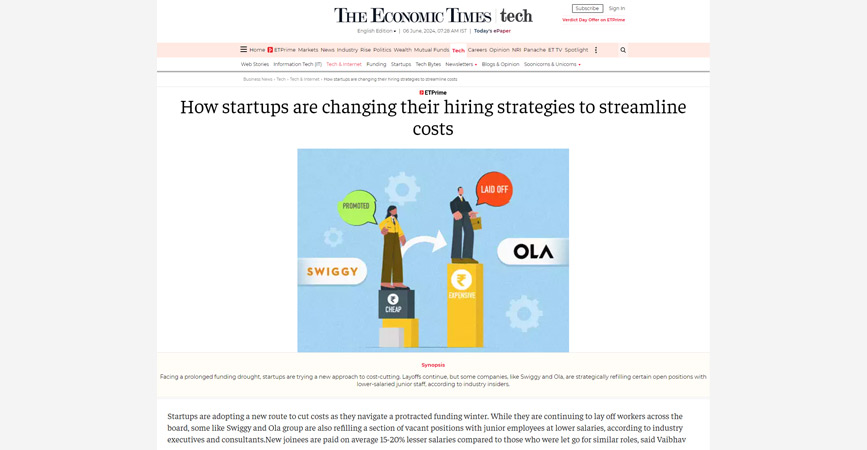
Startups are adopting a new route to cut costs as they navigate a protracted funding winter. While they are continuing to lay off workers across the board, some like Swiggy and Ola group are also refilling a section of vacant positions with junior employees at lower salaries, according to industry executives and consultants.
New joinees are paid on average 15-20% lesser salaries compared to those who were let go for similar roles, said Vaibhav Parchure, partner at startup hiring firm MetaMorph.
However, not all roles are replaced, with firms often downsizing and getting rid of teams working on new business ventures or “moonshot ideas”, said senior human resource (HR) executives.
The rehirings follow large scale layoffs at major startups like Flipkart, Swiggy, Paytm and Ola Cabs. While online retailer Flipkart laid off 1,100-1,500 employees, Paytm let go of more than 1,000 employees and Swiggy fired about 400 employees. ET reported on June 3 that IPO-bound Ola Electric is finalising plans to lay off 400-500 employees, just weeks after sister firm Ola Cabs laid off around 200 employees.
Replacement hirings tend to happen more in high-compensation teams like product and engineering, said Anshuman Das, cofounder and chief executive of talent solutions firm Careernet. “Layoffs in product and engineering teams, where salaries run very high, can have a much larger cost benefit for companies when compared to layoffs in teams like operations or sales,” he said.
Reassignment of work is also common, where a smaller team is tasked with similar work and targets after some employees are laid off.
Even inside teams, the impact of layoffs is often on higher-paid employees, a senior HR executive said. “If one person is earning 2.5-3 lakh, while another is earning 10 lakh, and letting go of the higher earner does not massively impact the business, then obviously the higher earner will be let go,” the executive said.
Companies are also benefiting from what human resource executives term as an ‘employer-driven market’, where interview processes are getting longer and harder compared to the funding boom days of 2021 to 2022 when a ‘candidate-driven market’ meant employees had multiple offers that they could cross-negotiate for higher salaries.
“Hiring for the same roles are happening at about 20-30% lower salaries compared to the funding boom days, and employees are willing to take up new jobs at 10-20% hikes, where the norm previously was about a 50% hike,” said Harold D’Souza, cofounder and director at executive search firm WalkWater Talent Advisors.
Wider hiring base
Major startups like Flipkart are looking beyond ‘Tier 1’ colleges like Indian Institute of Technology (IITs) to hire employees at more rationalised salaries, Parchure said. Talent from lesser-known colleges have better resources to improve their fundamental skills, while things like quality contributions to Github or Stack Overflow are also becoming vital for recruiters.
“So even if you aren’t from a top college but you have, say, three years of very impactful track record at the previous job and a great profile on Github, major startups will be more open now to considering you. It also helps the company as they can usually hire them for lesser compensation,” Parchure added.
Employees are also increasingly upskilling themselves for new roles. “For a lot of startups, a degree is not equal to skills, and a lot of people from small colleges perform well as they improve their skills. In our online programmes, for instance, even students with commerce degrees develop skills and compete for the same roles as a tier 1 or 2 engineering college student,” said Siddharth Maheshwari, cofounder of Nexus Venture backed technology upskilling platform Newton School.
Across positions
Senior leadership positions, which have also seen considerable layoffs and churn in the last few months, are also being filled for “rationalised” salaries, D’Souza said. At senior levels like vice president and above, new hirings are happening at about 20-25% lower salaries.
Startups are also increasingly looking internally to fill up senior positions. “Internal promotions can save time and money as you know the candidate very well, while demonstrating internal career progression… major startups are increasingly investing in identifying and nurturing talent internally for senior roles, similar to traditional firms like Unilever and Tata,” D’Souza added.
Source: The Economic Times








